#nymphs failing love affairs
Text
when i told my mom about him and all she had to say was "you couldn't find someone with a prettier name?"
#that shut me up real quick#she would kill me if she knew i still liked him 👍#four months later 👍👍#nymphs failing love affairs
7 notes
·
View notes
Text
Because I already brought this up on Reddit, let’s talk about it here too.
LONG POST ABOUT HADES, HERA AND AVOIDING ACCOUNTABILITY LIKE THE PLAGUE INCOMING.
Persephone knows that Hera and Hades had a thing now, right? So after guilt tripping herself all day for feeling insecure, they finally talk about it. Hades admits to having feelings for her once. Feelings, let’s be specific. He hasn’t yet said they had a relationship or a centuries long affair behind Zeus’s back.
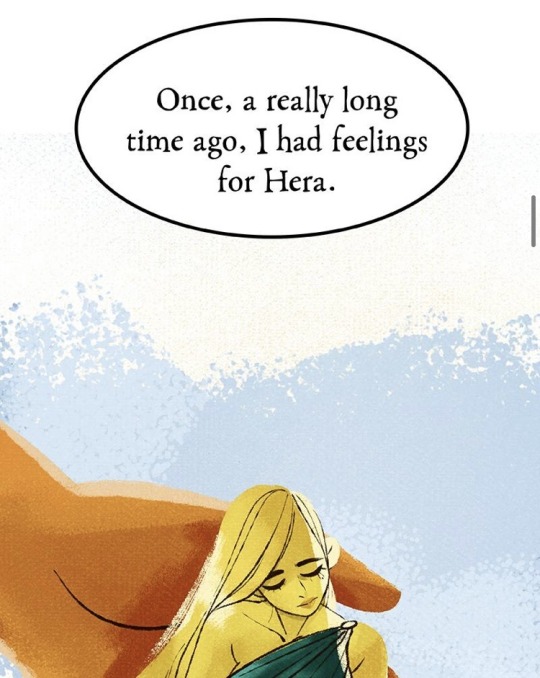
Persephone, as any sensible person would, asks a very fair question. Let’s ignore how disconcerting she looks for a second.
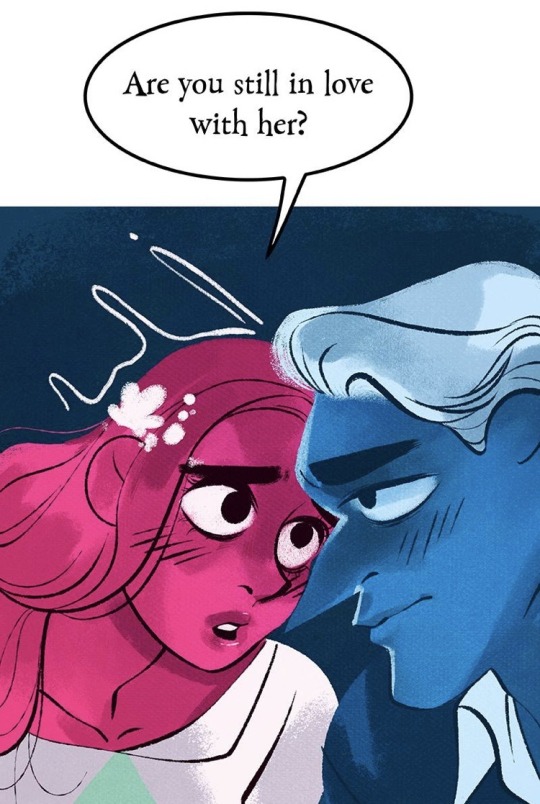
Now the response any normal fucking person would give here would obviously be “no”, right? Or some variation. “No, I’m not.” “No, we’re just friends.” “No, that’s in the past and I love you.”
That’s the normal, reasonable, acceptable response…but this is Lore Olympus. So naturally Hades doesn’t do that.
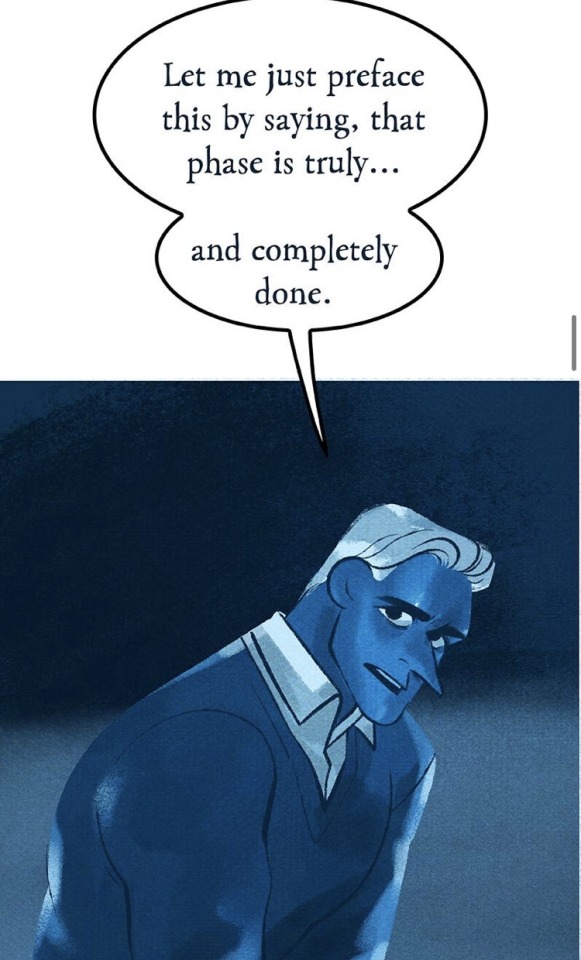
“Let me just preface this” oh I just know I’m about to hear some male manipulator bullshit. All that shit he just said when he could have simply said “no”. Also, why the pause?
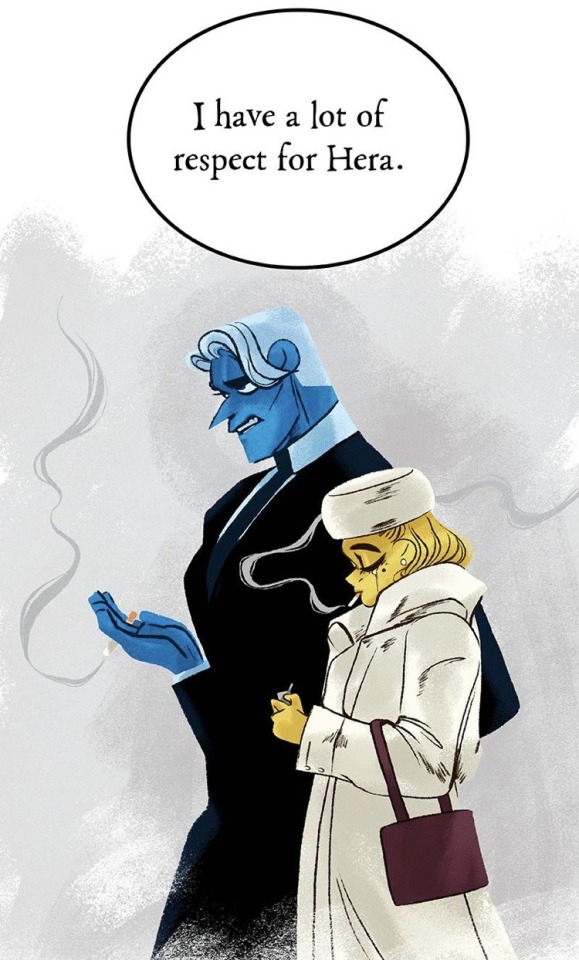
Never fails to make me laugh how LO Hera is supposed to be this glamorous, sympathetic, strong, aspirational figure that Persephone and the audience alike should revere, when all she is is a racist, classist, deadbeat parent and chain smoking drunk whose primary hobby seems to be putting on too much mascara just so she can cry it off every other chapter.
Also, Hades, if you had a lot of respect for Hera, you wouldn’t be telling Persephone all her business without her knowledge or consent.
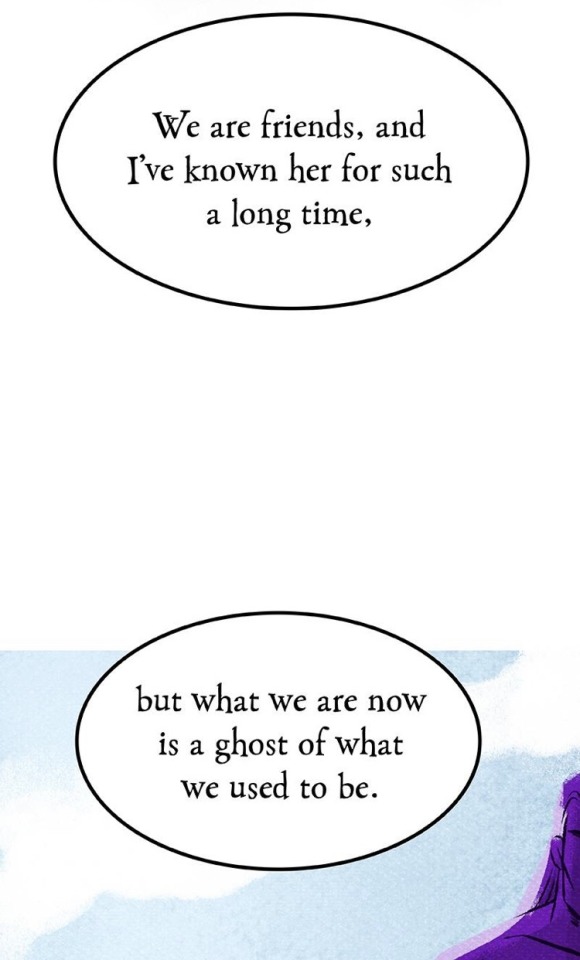
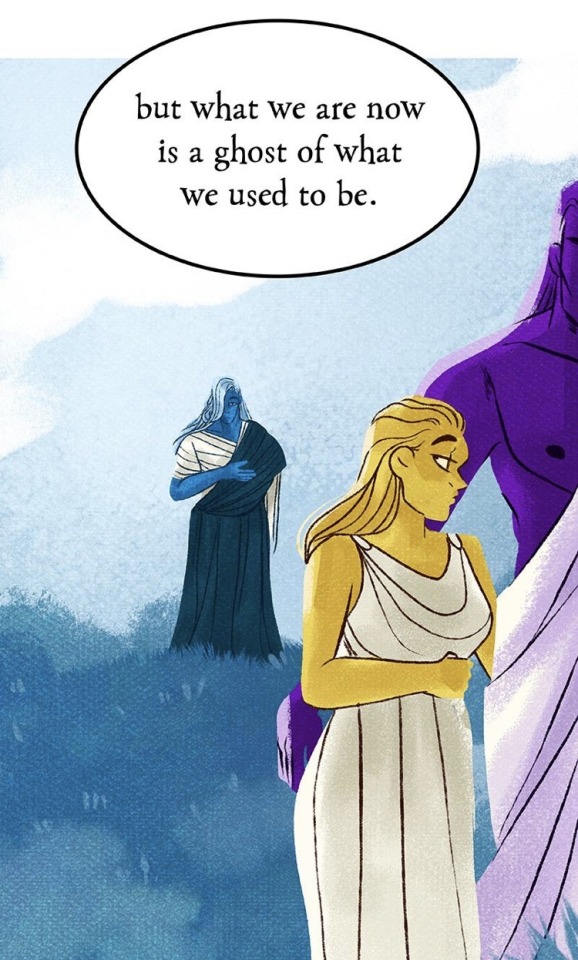
JUST SAY NO YOU ANTISEMITIC LOOKING MOTHERFUCKER.
What does that even mean? “What we are now is a ghost of what we used to be.” What a weirdly vague yet specific choice of words.
What did you used to be? Hades never says what they were or how long it went for and he still never fucking says it’s over. Now it’s just…a ghost? What’s that then, Papa Smurf?
Are you still haunted by this relationship? Is it like a ghost in the sense it’s going to come back cuz that’s what ghosts do? Cuz I’m not hearing “that phase is completely done”, I’m hearing “this phase is on pause and will most definitely be picked up on again the second the opportunity presents itself”.
Like I said, it’s such a weird, specific choice of words.
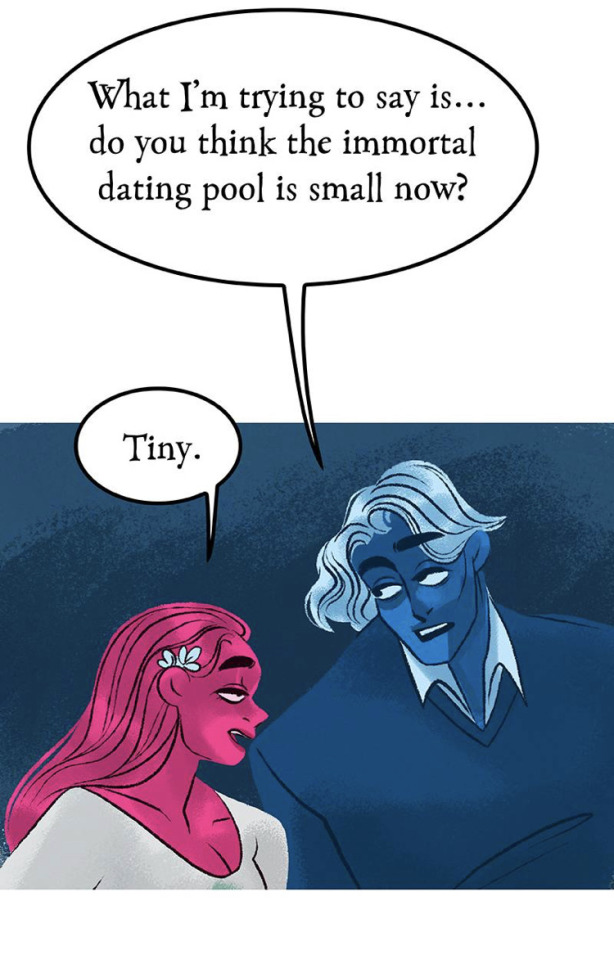
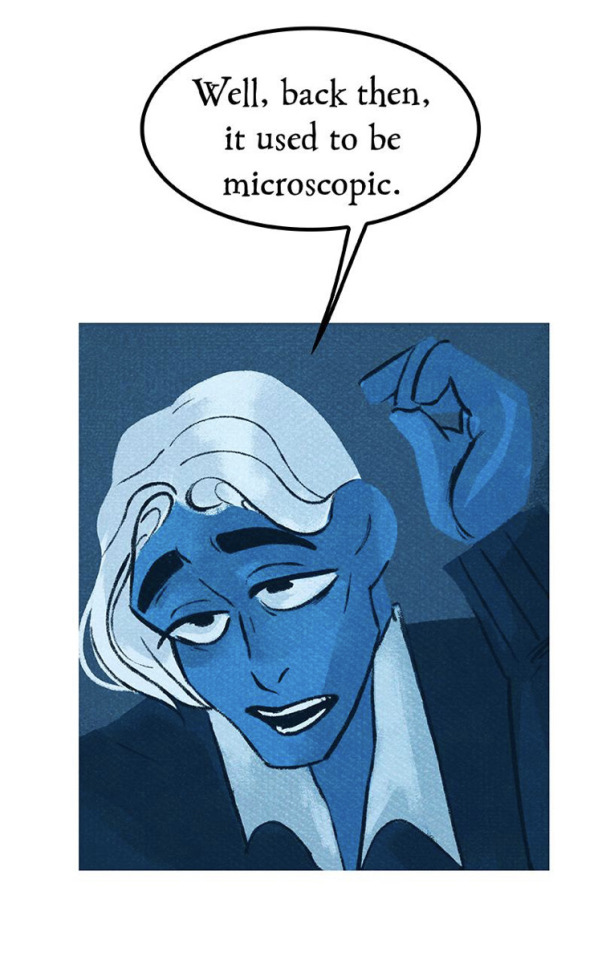
To quote Mabel “Madea” Simmons, “look at him try to throw it on you now. It’s like if he tries to get Persephone to engage and agree with him, then it’s all okay and he’s successfully excused himself and distracted from the question at the same time.
First, a couple of petty things. One, look at how wonky his eyes are. Those were adjusted last minute and you can see it. Also his hairstyle changed with each panel.
Second, there have always been a lot of immortal beings around. At the specific time we’re talking about back when Hera and Hades first got together, for example, there was already a whole mess of chthonic gods running around. There were nymphs, satyrs and other immortal creatures that were and are perfectly viable dating options.
Hades just so happened to want the woman who was dating his brother and banging his dad, and Persephone just so happened to get involved with two of her cousins and then marry her uncle.
This whole “the immortal dating pool” comment feels like a disclaimer to avoid the fact that, try as she might to avoid it, Rachel ended up right back in the incest pit that all Greek mythology adaptions inevitably try to avoid yet fall into in the end.
I’m also not going to pretend that these two having such a limited word view on dating options doesn’t stem from the fact that they think basically everyone else is inferior to them.
But, in conclusion, Hades was asked a fair question that required a one word answer. One word, two letters…and he could not do it.
Instead we get dragged on this purple prose wannabe, “I’m 14 and this is deep” diatribe that barely skims the surface of what his entanglement with Hera really was. Immediately following this, Hades goes on to explain Hera’s golden traitor title and her history with Kronos. This is also the infamous chapter where he claims Zeus has no trauma.
He was more comfortable discussing his father abusing and then brutally maiming Hera, and more comfortable minimising what happened to his brothers, than he was just saying “no, I don’t love Hera anymore”.
Rachel does this for Hades a lot. Hades is, at least in my opinion, not one of the more interesting greek deities and the fact he’s the male lead of LO and her celebrity crush’s insert means she feels the need to beef up how important, how powerful, how desirable, how vulnerable, how lonely, how angry, how complicated he is, but does not possess the skill to do so.
So she writes herself into a corner and the mountain of evidence for Hades being a fucking awful person gets bigger.
For example, as we just saw, Hades had a thing with Hera. He’s soooo sexy and so hot and so kind and so perfect and so irresistible and desirable that even Hera can’t resist him! But wait! Making Hades and Hera have a centuries long affair behind Zeus’s back and with Hades going into another relationship where he cheats on his current girlfriend, Minthe, with Persephone, doesn’t reflect well on poor daddy Hades! What to do??
The simple and logical route, other than just not having the stupid affair in the first place, is for Hades to just admit he made a mistake and he regrets it and is trying to do better. But wait! Daddy Hades is a complicated and edgy bad boy…but he can’t actually do anything bad cuz he always has to be in the right!
So instead of ever admitting he’s wrong, god forbid he do that, let alone apologise, every time we get treated to what a piece of shit he is and the consequences of his bad actions and Rachel’s bad writing, we get tormented with more faux-deep prose that’s meant to paint him as a helpless lonely victim and remove any blame from him, while conveniently always minimising and dismissing someone else’s suffering.
I’d kill to see what sad, poetic, overly-wordy garbage he spins when he inevitably cheats on Persephone with Hera, because this whole exchange all but screams that the door is very much still open.
Persephone felt bad about herself for being insecure by the chemistry and contact that Hera and Hades still have, because how could she even think of misjudging poor dear Hades? IMO, she’s not worried enough. Homegirl is already on her way to ending up where Minthe was.
#lo critical#antiloreolympus#lo criticism#lore olympus critical#anti lore olympus#lore olympus criticism#here we go#art belongs to Rachel and her team
124 notes
·
View notes
Text
The Gods are LGBTQ Supportive.
Poseidon and Nerites: On The Nature of Animals, 14.28 "Other stories say that Nerites was loved by Poseidon and loved Poseidon in return, and hence this was the origin of Anteros.And so, as I hear, Nerites spent time with Poseidon and when Poseidon drove his chariot above the waves his speed surpassed all the marine beasts, for the fish, dolphins, and tritons rose from the sea, excited and circling and dancing around, all stopped and were left behind.Truly, Nerites was always near, attending him. The waves submitted with reverence for Poseidon, the sea separating and withdrawing. Because Poseidon wished, the beautiful Nerites to be prominent for many reasons, among them swimming."
Nerites’ sisters begged the god Poseidon to change him back, and he obliged. The mighty sea god was smitten from the sight of the boy, and he offered to make him his charioteer. Nerites agreed, and Aelian says they lived together happily ever after as companions and lovers, even mentioning that the word for mutual, requited love – anteros – derives from Poseidon and Nerites’ love affair.
Poseidon and Caenis--Caeneus was originally a woman named Caenis who was transformed into a man[6][7] by the sea-god Poseidon.[8] According to the Greek mythographer Apollodorus, and a scholiast on the Iliad, Poseidon had sex with her, and afterward she asked him to turn her into an invincible man; Poseidon granted her wish.[9][10] According to Acusilaus, whose version is the earliest surviving, Caenis (here spelled Καινή, Caene), after having sex with him, asked Poseidon to turn her into a man so that she would not bear his child, or anyone else's.[11][12] In another version, Poseidon wished to sleep with her, but Caenis made him promise her a favour in exchange for hers; he did, and she asked to be transformed into a man, whereupon he granted her wish, but due to her change he failed to fulfill his own
Poseidon and Pelops-According to Pindar's First Olympian Ode, Pelops, the king of Pisa, once shared "Aphrodite's sweet gifts" with the ocean god himself. Pelops for a time was taken to Olympus by Poseidon and trained to drive the divine chariot.
Zeus and Ganymede the cup-bearing god of homosexuality.
Apollyon and his various male lovers: Admetus, Branchus, Carnus, Cinyras, Cyparrissus, Hyacinth, etc. Apollo was also lover to Macedonian Prince Hyakinthos, who died catching a thrown discus, then turned by the god into the hyacinth flower. The Pseudo-Apollodorus also said Apollo had been with Thracian singer Thamyris in the first man-on-man relationship in history. And for those who think same-sex nuptials are a 21st-century invention, Apollo also was in a relationship with Hymen, the god of marriage
Chin and Xochopili the Mayan/Aztec gods of Homosexuality.
Hermes- The wing-heeled messenger of the gods was said in multiple myths to have male lovers. In a variation of the Hyacinth myth, it was Hermes' lover Crocus who was killed by a discus thrown by a god before being turned into a flower. Some myths suggest a romantic relationship between Hermes and the hero Perseus. And while some stories list Daphnis, the inventor of pastoral poetry, as the son of Hermes, other sources claim him to be the god of speed's favorite lover.
Dionysus- Best known as the Greek god of wine, Dionysus was also the god of intersex and transgender people. Male lovers of the god included the satyr Ampelos and the famously handsome Adonis. He also once made a journey to Hades and was guided by the shepherd Prosymnus, who led the way in exchange for the chance to make love to the party god. When Prosymnus died before that deal would be consummated, the god created a wood phallus to ritually fulfill the promise, according to research by a number of Christian historians, including Hyginus and Arnobius.
"Perhaps the earliest literary reference to an intersex person concerns this child of Hermes and love goddess Aphrodite who as a youth encountered the nymph Salmacis, who attempted to seduce the youth and asked the gods that their forms be permanently joined. The creature of both sexes was frequently depicted in classical art as a figure with womanly breasts and form but with male genitalia. Above: Francois Joseph Navez, The Nymph Salmacis and Hermaphroditus."
"Twin sister to Apollo, the goddess was by differing accounts a nearly asexual virgin or a lesbian with many nymph lovers, including Cyrene, Atalanta, and Anticleia as well as moon goddess Dictynna. By some accounts, she was Callisto's lover before the nymph was raped by Zeus. Researcher Johanna Hypatia-Cybelaia writes that lesbian and gay devotees worshipped her as Artemis Orthia, and that lesbian port Pamphilia referred to the goddess in hymn as Artemis Pergaea."
Heru/Horus and Set/Seth
While the goddess of love is not identified prominently as lesbian herself, the Greek poet Sappho (as in sapphic) of Lesbos (yes, as in lesbian) told many homoerotic tales and named Aphrodite as the greatest patron and ally of lesbians and homosexuals within the Greek pantheon of gods.
The Egyptian goddess Isis/Aset/Auset, also worshipped by Greeks, is known for solving a gender identity issue of yore. Iphis was born female but raised male by his mother, who concealed the truth because her husband wanted a male heir. Ultimately, Iphis fell in love with Ianthe, a woman, and was betrothed to her. Before the wedding, Iphis prayed in the Temple of Isis for a solution, and voila! she became a he.
17 notes
·
View notes
Photo
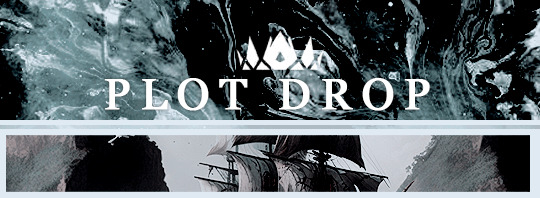
Plot Drop #1: Police Report
The police report has finally been leaked as has an update to the investigation, leading to sirens and naiads facing new scrutiny. However, this has also significantly damaged the reputation of the late mayor, leading many to insist that the information has been fabricated, as said mayor despised supernatural beings.
Hanjeong Police Department
Case No. 2023-005
REPORT OF INVESTIGATION
On January 3, 2023, at approximately 12:30 AM, the body of Ujin Sook, 56-year-old male of Hanjeong, was discovered in his residence at 5112 Oak Street. Police were immediately notified and arrived at the scene at 12:45 AM.
Upon arrival, police found the victim lying on the living room floor with multiple lacerations to the chest and abdomen. He lay in a puddle of water. There were also signs of a struggle in the room, with overturned furniture and broken objects. The victim's son, who had come to check on him after several failed attempts to contact him, discovered the body.
A preliminary investigation of the crime scene revealed no signs of forced entry. A window was found open. This is believed to have been the point of entry for the assailant. However, the motive for the attack is currently unknown.
An autopsy was performed on the victim's body, but the results were inconclusive. While there were no obvious signs of supernatural involvement, we cannot rule out the possibility of a supernatural creature being involved in the crime due to the nature of the wounds.
After an interview with the late mayor’s secretary, it has been revealed that Ujin was having an affair with an unidentified siren. Police are currently searching for the individual to interrogate them. It is rumored they are currently in hiding in the ocean. Officers are working with the merfolk monarchy in hopes of them helping with the search.
This investigation has also led to the revelation of a naiad ex-partner who was stalking the individual months leading up to the homicide. The naiad in question has gone missing, possibly having been smuggled out of Hanjeong by the Black Sand Smugglers.
Police are currently still investigating.
Some ramifications due to the police report being leaked:
The late mayor’s family are insisting that this is all hearsay and that it is impossible for Ujin to have been having an affair.
Naiad and siren businesses are being vandalized.
Some are accusing the merfolk monarchy and nymph usurpers of spreading the rumors in the name of politics.
Protests are occurring outside of city hall from various parties.
Enforcers
Time to stop these potential murderers (or witnesses) from leaving Hanjeong. Feel free to break into a few businesses. It’s not like you need a warrant.
Black Sand Smugglers
Do your best to get the naiad out of town without being caught. She keeps insisting that what they had was true love and that she didn’t kill Ujin. Of course, that’s not all that important in your line of work anyways.
The Resistance
Despite popular belief, the siren has taken refuge with you instead of the ocean. Unfortunately, she is getting a bit stir crazy in the Watering Hole and it is starting to affect the patrons. Thankfully, no one has caught on. Yet.
Profiles for these NPCs (feel free to use them in your plots for this plot drop):
Name: Kim Yeji
Species: Siren
Age: 127
Occupation: Lounge singer
Background: Yeji was a lounge singer at the bed and breakfast during special events, but also a performer at various spots around Hanjeong. She had a brief fling with Ujin, but ended things when she realized he wasn't interested in a serious relationship (though it was fun messing with his stalker). Like many sirens, she is not good at being told what to do, which does not make her the easiest person to protect.
Name: Kim Soojin
Species: Naiad
Age: 120
Occupation: None
Background: Soojin is a reserved individual and was a former partner of Ujin Sook, but the relationship ended badly. She became increasingly possessive and stalked him for months leading up to his murder. She is also currently pregnant with who she claims to be the mayor’s child.
#hanplotdrop#krp#kpop rp#krpg#mystery rp#murder tw#violence tw#infidelity tw#stalking tw#pregnancy tw
2 notes
·
View notes
Note
Here is a continuation of the blood cult au. Here are some extra tidbits of lore about the leader. Raum was the demons real name. He feel in love with a nymph name Viviana. Viviane fell in love with Raum. Raum was sealed in a box for five years until a liitle girl opened it. He tried finding Viviana until he saw her body was found being buried by a young child. Raum still was a divine spirit. Raum found out thru the child she died out of a broken heart from discovering an affair. Raum out of insanity casted a curse on the town killing all the adults in the town. That event marked him as a demon. The demon tried to ressurect Viviana but it failed as nymphs cannot be revived by normal or demonic means. He tried many times to do a ritual that could bring his love back. During that time he started the cult. Many heroes failed to kill him. Raum started a cult which could he could have loyal test subjects. What happened was he tried on women to and it did not work only death. He tried this on men where it created an abomination but he continued with that route. He tried this ritual on Clemont and it turned him into partial demon.
Sorry, this took me a little bit to respond! I wanted to wait till I had the time too!
I love the backstory! It's a very sad backstory but I loved it! poor Viviana! very interesting that the ritual doesn't work on women and only creates monsters out of men. I like that bit of world-building!
thank you for sending it through and hope to hear from you soon!
lots of love mae xx
3 notes
·
View notes
Text
30 Days of Deity Devotion ( Aphrodite ) - Day 6
Other related deities and entities associated with this deity
In myth, Aphrodite is deeply, madly in love with Ares. When Zeus decided to offer Aphrodite’s hand in marriage to whoever would bring Hephaistos back to Olympos ( after he cursed Hera ), Aphrodite agreed, convinced that her love would prevail and that they would finally be able to get married. Ares tried, and failed, and Hephaistos decided to go to Olympos himself ( from an idea Dionysos gave ), and was thus the one who got to marry Aphrodite.
She, however, was never in love with him, and continued to have an affair with Ares. Hephaistos found out, and built a golden net to imprison them the next time they would lay together. His plan worked, and all the gods got to see the both of them.
After this, Hephaistos and Aphrodite divorced. Hephaistos went on to marry Aglaia, and Aphrodite stayed with Ares.
-
Aphrodite had a lot of other deities for her attendants, some of them part of the Kharites: Antheia ( goddess of floral decoration ), Aglaia ( goddess of beauty ), Euphrosyne ( goddess of merriment ), Thalia ( goddess of good cheer ), Paidia ( goddess of play ), Eudaimonia ( goddess of happiness ), Pandaisia ( goddess of banquets ) and Pannyakhis ( goddess of parties and night revels ).
Another well known attendant I’ve mentioned before is her son Eros. He’s not the only one of them amongst her children though, as Harmonia, the Erotes and Peitho were also part of her retinue. In the case of Peitho, she is also her herald.
She is also often depicted surrounded by the Horae: Eunomia ( goddess of good order ), Eirene ( goddess of peace ) and Dike ( goddess of justice ). If not by the Kharites, it’s by some Nymphs ( usually the Naiades or the Nereides ) or by Tritones.
Not all of her companions can be classified in groups or as her children though, including Hebe ( goddess of youth ), Genetyllis/Eileithyia ( goddess of procreation and childbirth ), Krysothemis ( goddess of an unknown role, simply listed as goddess of the “golden custom” ) and Paregoros ( goddess of consolation ).
-
She is also associated with other deities who are neither part of her retinue or her lovers. This includes Hera, with whom she often interacts in myth and Hymenaeus ( god of the wedding hymn of the bride’s train ).
A somewhat UPG association I have of hers is a link to Herakles. Herakles had some aspects giving him a role as a deity of marriage in Attica, and thus I would like to think of them as working together. I don't call this a full UPG, since she is said to have worked with him during the Gigantomachy, but seeing as it was in a different kind of situation, I still put it down as UPG.
#aphrodite deity#aphrodite#aphrodite worship#30 days of deity devotion#30 days of devotion#hellenic polytheism
4 notes
·
View notes
Text

IRIS VAMPIRE.
NAME: UTP of ASHFORD.
OCCUPATION: HEIR.
AGE: 48-55.
PRONOUNS: UTP.
FC SUGGESTIONS: Alexander Skarsgard, Alan Van Sprang, Gillian Anderson.
IRIS.
Tw murder.
You were raised to believe that the world was yours for the taking and, much like your eldest cousin, you behaved like everything belonged to you. People were there to entertain you and push your goals forwards and you cared very little if you’d hurt someone in the process. It would seem that you only loved yourself, but things changed when you met your spouse - or at least the person you craved to make yours. Your parents had a different idea, arranging for you to marry a woman from a different family. It was a good family, powerful and with assets your family needed, but you were blind to your own ambition and your lust. Your family wouldn’t budge, but you always got things your way, always, no matter the price. At first, you tried reasoning with your bride, but when reason failed, steel spoke. No one but you knows what happened that night and you played your part as a jilted lover, left at the altar to perfection. It was a dreadful affair, shameful for the family of your missing bride, but it needed to be done and you have no regrets - not when you got what you wanted and with sympathies instead of a scandal you’d have otherwise drawn upon yourself.
Conscience is a wicked thing. Three decades later and with a fortuitous match on the horizon for your eldest niece, those things you’ve done began to resurrect. You swear you can see her in the corner of your eye, the shadowy figure distorted and wailing… and violently enraged. The upcoming nuptials are making you uneasy but you’d never admit to it, not after everything you’ve done to secure it.
VAMPIRE.
You take and you take and you take until your prey is sucked dry, lifeless in your cold embrace. Those who know you think highly of you, of your elegance and sophistication. But, those who truly know you, they understand there is not a single redeeming quality about you. You are a monster, a creature of nightmares and like those things you feed off poisonous blood. You know that blood will one day choke you, but with a grin you wait - you’ll bathe the world in liquid scarlet before it puts a price on your head.
INVITED TO TEA.
JESSAMINE DAEMON. You are an only child to your parents, but your cousin has always been like your sibling. The two of you are more alike than different, but unlike you, they have never tainted their hands with blood - and for the first time in your life, you’re unsure if they would keep supporting you if they knew what you’ve done all those years ago.
BELLADONNA NYMPH. Your youngest niece is sweet and gentle, not at all like your cousin. Her elder sister is more to your taste when it comes to character, but you care about her. You already have a candidate or two in mind for her nuptials as well - where you picked her sister’s match solely for the sake of prestige, you are more inclined to take Nymphs emotions in consideration when it comes to her potential nuptials.
ACONITUM FURY. You are cordial with your younger cousin, but to be honest you care less than little about them. Their nature doesn’t agree with you and so you steer clear of them, unless it’s absolutely necessary to be in their presence - if only for your elder cousin’s sake.
PEONY WEREWOLF. If there is anyone in this world that you truly love it is your spouse. They are your other half and while you’d never acknowledge it, or admit it to anyone else, they are the only one who can make you better, even if for a minute. After everything you’ve done to be with them, you are content with knowing that for three decades you’ve lived in undisturbed, pure bliss with them.
DRAGONBLOOD CETUS. You arranged everything for him. The only thing he had to do was agree and shake hands and, after some needless consideration, he did. You don’t think too highly of him and, save for his wealth and noble name, he is useless to you. You don’t like emotional people and he doesn’t shy away from showing his emotions.
VIOLET GORGON. There’s something strange about them. Stranger still that whenever you look at them you feel remorseful. You don’t know why and you don’t care to know why they elicit such a feeling, but you know they avoid you and it makes you careful around them.
IRIS VAMPIRE IS PORTRAYED BY UTP AND OPEN.
#iris vampire#open#all#new rp#original rp#regency rp#skeleton rp#period rp#lsrp#horror rp#supernatural rp#mystery rp
0 notes
Text
Józef Poniatowski’s women.
Part II. Three ladies who supposedly tried to seduce him.
First of all, I would like to inform you that the story below looks to be a kind of legend. And there is no hard evidence that it really happened. But some diarists recall it in the Memoirs, that is why I thought it is worth to mention.
So, this is said to be happened also, like the episode of “riding naked”, during the Great Sejm. That time Pepi had an affair with the actress “Zelia” Sitańska. But three most beautiful women of that time Warsaw - Julia Potocka, Rozalia Lubomirska and Barbara Kossowska - were not satisfied with the state of things.
So on prince Jozef’s name day they “bribed the butler for letting them into Poniatowski’s bedroom while the latter was absent, decorated his bed with flowers and clothed themselves as Nymphs”. And when the prince eventually returned home, the Copper-Roofed palace („Pałac pod Blachą”), they appeared in front of him in all their beauty.
But this all, as it turned out, was to no avail, because Pepi came not alone, but with his beloved Zelia. Whom he stately refused to abandon, despite all the pleas. So the ladies had to withdraw, being non the wiser (some diarists even mention, that leaving, the women intentionally broke all the nice things they decorated Pepi’s bedroom with).
So, that’s the story. (As I mentioned before, there is no hard evidence it in fact happened. But if it did, and in the time of the Great Sejm, it could not have happened in the Copper-roofed palace, because Pepi didn’t live there yet.)
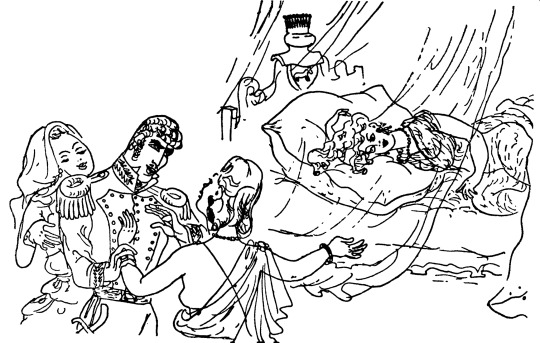
And here is a drawing, showing how this “seduction” might looked like, by Maja Berezowska.

(And, of course, I wasn’t able to resist and made a Photoshop from it, using real portraits of people participated.)
But let’s have a close look to the three Nymphs, who failed to seduce Pepi.
Number one, on the right hand side of my creation - Julia Potocka.

A portrait by Johann Baptist von Lampi the Elder, about 1789
Being born in 1767, she was the eldest of the “Three Nymphs”. Here maiden name was Lubomirska (yes, she was a distant relative of the husband of Rozalia, and, btw, a second cousin to prince Józef).
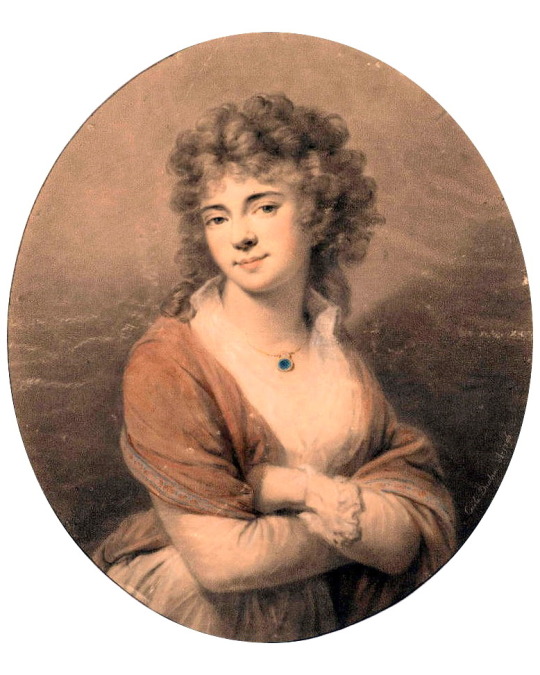
A portrait by unknown author
In 1785 Julia married Jan Potocki (the future author of The Manuscript Found in Saragossa). In two next years their two sons were born.

A portrait by Kazimierz Wojniakowski, 1795
But as for Julia’s feelings towards Poniatowski and her probable participation in the visit - I have great doubts.
Yes, she was considered to be very beautiful (her nickname was “Giulietta la bella”), and everyone was enchanted of how she danced. But together with this Julia Potocka was known a very virtuous woman. Secondly, if there existed a man for whom she could have broken the marital oath it was not Pepi, but his friend, Prince Eustachy Sanguszko.
But the love-story of these two was a very sad one. Several years after the Great Sejm they had to spend abroad, he in Russia and she in France. When they both returned to Poland in 1794 prince Eustachy joined the Kościuszko uprising. And then Julia… died unexpectedly of tuberculosis.
It happened in Krakow, and Eustachy that time was near Warsaw. Having learned about the death of his beloved, he took a vacation under the word of honor. But when he finally got to Krakow, it was too late. The funeral had already started. So the only thing heart-broken Eustachy managed to do later was to get to the tomb with the help of a friendly priest…
The second lady of the trio was Rozalia Lubomirska.
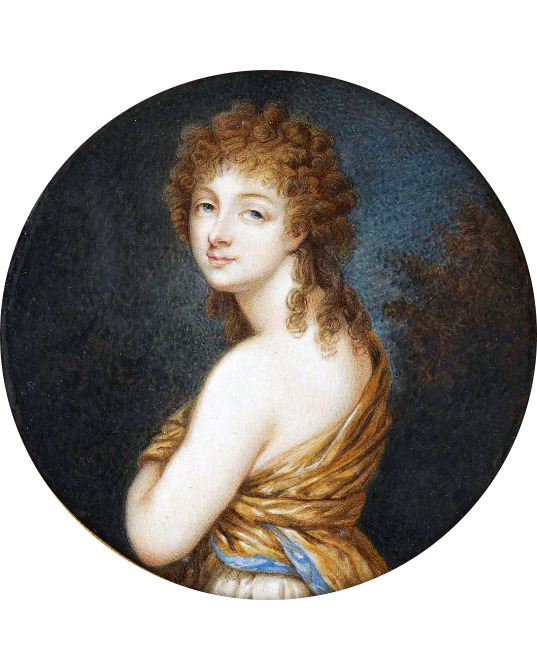
Wincenty de Lesseur: Miniature of Rozalia Lubomirska née Chodkiewicz, between 1794 and 1796 (btw, it was just this image which inspired me to create the Photoshop from the drawing of Maja Berezowska. And something prompts to me the painter as well had seen and been inspired by it )))
Rozalia was a little bit young than Julia, but by 1789 she was also married (to the prince Aleksander Lubomirski) and had a daughter with him.

Anna Rajecka: A girl with a dove, possibly portrait of Rozalia Lubomirska née Chodkiewicz, between 1789 and 1790
Contemporaries remembered the princess Lubomirska as a beauty, with a filigree figure, golden blonde hair and blue eyes. But here participation in Pepi’s seduction either doesn’t seem to look probable.
Because in the summer of 1788 Rozalia left with her husband for Paris, and prince Józef came to Poland from Austria to Poland only in autumn of that year. And when two years later she return to Warsaw she fall in love with another man. His name was Tadeusz Mostowski and it looked like he reciprocated her feelings.
In the fall of 1792, they left for Switzerland almost simultaneously. And a year later, when he had to go France on a diplomatic mission, she followed him.
But during the next year their feelings, it looks like, that faded away. And when in autumn of 1793 Mostowski left Paris, princess Lubomirska decided to stay there alone. And was arrested.
The next six months she spent in prison. Of course, there were some efforts to free her. Made by Mostowski and others. But to no avail. It was said that Robespierre himself had fallen in love with Rozalia, but had been rejected, and for that very reason he was relentless.
Anyway, in June 1794 princess Lubomirska was executed…
So, let’s move to the last “participant” of the visit, Barbara Kossowska.

Portrait of Barbara Kossowska née Belińska, ab. 1800, by an unknown painter.
She was the youngest of the trio, being born in 1770 (though in some sources her birthdate is stated as 10 years before). She was also married, to a man 20 (or even more) years older than her.
And she was the only one of the three, who might have paid a visit to prince Poniatowski to the Copper-roofed palace, because in 1798, when he moved there, she, in comparison with Julia Potocka and Rozalia Lubomirska, was still alive. The diarists recalled how she drew everyone's attention while dancing with Pepi on the balls he arranged.
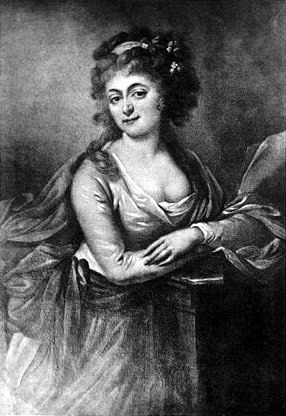
Portrait of Barbara Kossowska née Belińska, Johann Baptist von Lampi the Elder, 18th century
But even Barbara was not predestined to live long. She died in 1801. It is not known what exactly happened and with whom of her four children, but it looks like she gave her life saving one of them. Because the inscription on her tombstone in Powązki cemetery stated: "This grave hides the body of a virtuous mother, saving the lives of children, she has lost hers".
I am sorry, but the story of third “Nymph” turned out to be sad as well…
And this post was supposed to be a fun.
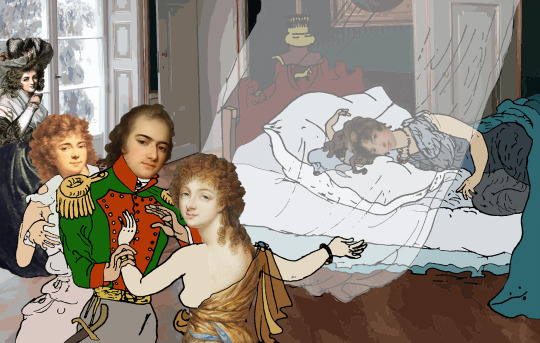
So, to sweeten it up I decided to add one more Photoshop (or, more exactly, the extended version of the first one). Here you can see not only the seducers but Pepi’s sweetheart Zelia as well. And as background I added in image of prince Józef’s bedroom from Myślewicki palace of the Royal Bath (Łazienki) park, which was his home in the times of the Great Sejm.
#józef poniatowski#józef poniatowski’s women#zelia sitańska#julia potocka#rozalia lubomirska#barbara kossowska#photoshop
30 notes
·
View notes
Text
me if embarrassing myself in front of my crush and his friends was a competition: 🏆🏆🏆🥇🥇🥇🥇🏅🏅🏅🎖️🎖️🎖️🎖️
#i actually don't care (i'll never show my face in school again)#THEY LAUGHED AT ME I'M DEAD#back at it again with#nymph's failing love affairs#nymph rambles#this accounts is progressively turning into a diary#i'll make marauders content soon i promise 💔
11 notes
·
View notes
Text
FOP AU: Royal Family of Fairy World
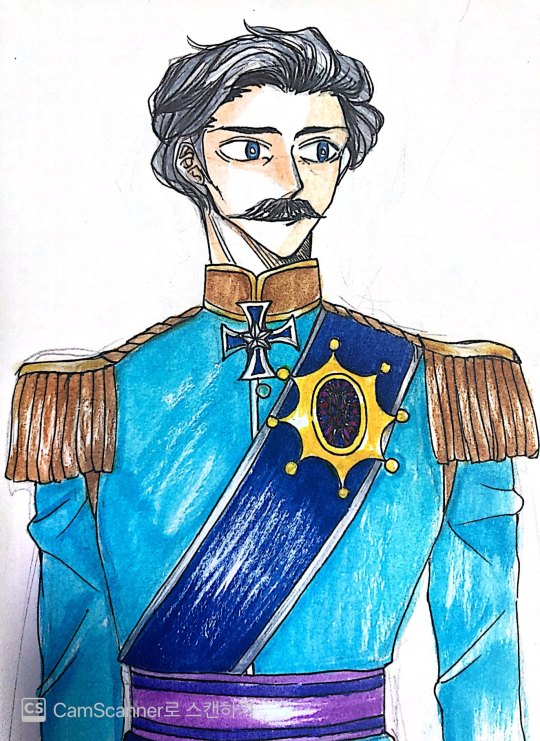
Name: Oberon Angelo Finbar
Age: Immortal
Occupation(s): King of Fairy World
Aliases: King Oberon, His Majesty, My King, Your Excellency
Friend(s): Blue Fairy, Albar Magnus (sometimes)
Interest(s): Attending holiday events, keep in check for the anniversary of his and Titania’s marriage, listening to whatever his wife told him to
Relative(s): Titania (wife), Aubrey (son), Tatiana (daughter)
Character
Oberon Angelo Finbar, known as King Oberon, is a ruler of Fairy World who is also husband of Queen Titania, father of Prince Aubrey and Princess Tatiana. Despite being known as ruler, it is stated that his status is more of a figurehead as only Blue Fairy is the one in charge of the Fairy World’s politics, economics and other affairs. With his wife and children, he is often seen presenting at many events taking place to celebrate.
Background
King Oberon was born from Royal Finbar family in Fairy World. Witnessing such entitlement and cruelty from his family who enslaved Pixies and other “lesser” magical beings, Oberon has grown tired of their behaviors as the Fairies have more enemies than allies. When the war of Fairies and Anti-Fairies took place in the Dark Ages, Oberon’s parents were killed in the battlefield as he was crowned king of Fairy World. Marrying Fairy Queen Titania of Olympian descent, they have managed to form a peaceful agreement with other magical beings to prevent further tragedies taking place on Earth.
When the Blue Fairy has taken the position as Prime Minister, the Fairies love her more than the Royals to the point of transforming her into a de-factor leader. However, being a king, Oberon failed to become a good father as his son turned out to be a spoiled brat as daughter hasn’t been grown for centuries. Noticing few god-children are growing, he is contemplating of forming new regulations for Da Rules.
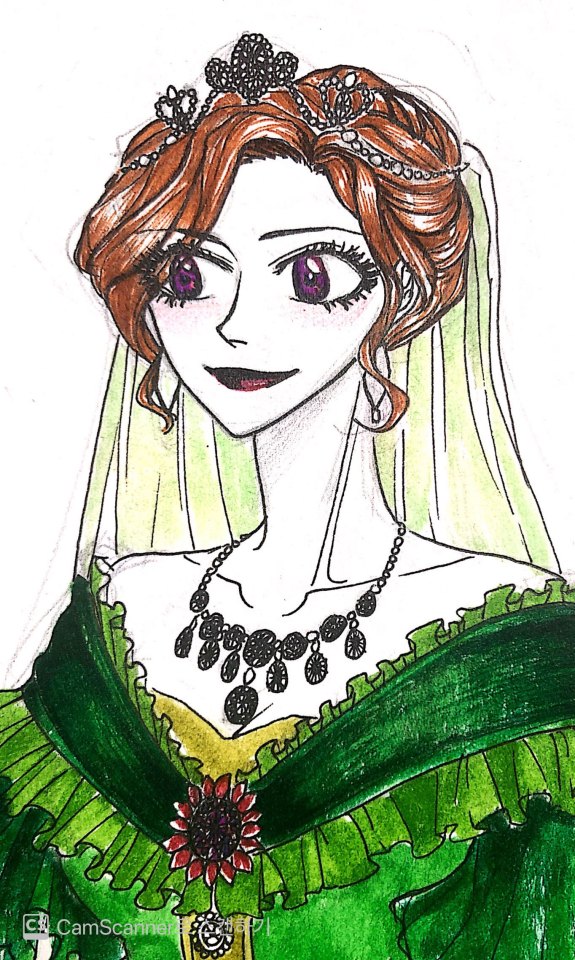
Name: Titania Ouranos Finbar
Age: Immortal
Occupation(s): Queen of Fairy World
Aliases: Queen Titania, Her Majesty, My Queen, Your Grace
Friend(s): Blue Fairy, Amitola, Eleanor
Interest(s): Politics, attending holiday events, tea party
Relative(s): Oberon (husband), Aubrey (son), Tatiana (daughter)
Character
Titania Ouranos Finbar, known as Queen Titania, is the queen of Fairy World, wife of Oberon, mother of Prince Aubrey and Princess Tatiana. Although she is a royalty, it is stated that her and her husband’s status as rulers are more of a figurehead. However, she engages in political affairs with Blue Fairy more than her husband. Unlike her husband, she is more rational in raising her children and tends to be stern when her son Aubrey threw tantrums for not getting anything he wants while she struggles in spending time with Tatiana.
Background
Queen Titania was born as daughter of Royal Ouranos Nymph queen, suspected to be Zeus’s illegitimate daughter for her mother was one of victims from being harassed by Greek God of Sky and Thunder. She couldn’t stand Oberon’s parents as they reminded her of entitled Greek gods but she agreed to marry Oberon for two purposes; restore the peace among magical races, expand its existence more than Greek Gods to weaken their power. However, she has grown to love her husband and have two children.
Although Blue Fairy has become a prime minister of Fairy World, Titania has decided to get involved in political affair, helping the blue fairy godmother forming regulations in Da Rules. She refuse to interact with whoever related to Olympian gods, but she seems tolerant of Heron and Zenaide who has recently became a fairies. Whenever her son Aubrey threw tantrum she is seen pulling him by his ear walking away from the crowd to scold him. Currently, she needs someone who can help with Tatiana’s development.
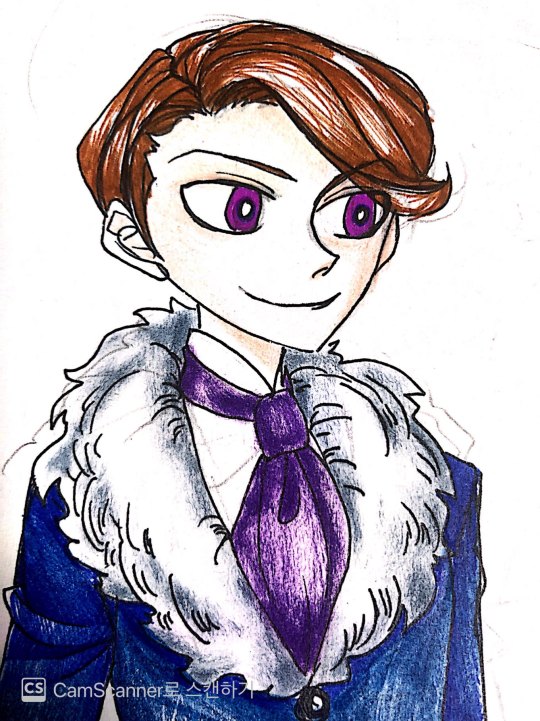
Name: Aubrey Halo Finbar
Age: Immortal (600+)
Occupation(s): Prince of Fairy World
Aliases: Prince Aubrey, Royal Brat, Aubie
Friend(s): Heron, Zenaide, Timmy
Interest(s): Getting anything he wants, parties, being in charge
Relative(s): Oberon (father), Titania (mother), Tatiana (little sister)
Character
Aubrey Halo Finbar, known as Crown Prince Aubrey, is a prince of Fairy World, firstborn of King Oberon and Queen Titania, and older brother of Princess Tatiana. With his parents busy and unintentionally spoiled them, Prince Aubrey is known to be the brattiest fairy with nasty tantrum if he doesn’t get what he wants. Yet at the same time, he does have some degrees of regal or elegant demeanors due to strict educations from his mother. Currently, he is coming in terms that being a prince doesn’t mean he would get everything.
Background
Born as firstborn and son of King and Queen of Fairy World, he was expected to be the heir to throne of Fairy World. While his parents were busy and had little time to spend with him, the servants and others gave him whatever he wanted as he grew as selfish brat. He has quite amount of magical pets in his palace; 3 Unicorns, 4 Hobo-goblins, 2 Chimeras, 5 Griffins, and 6 jackalopes. In many occasions, his spoiled and entitled demeanors brought troubles to the point of bringing near conflict with other magical races.
At one event of his birthday where all the god-children and their fairies were invited, he complained that none of their gifts matched to his taste. Unable to tolerate his rude and ungrateful behavior, Timmy was in her icky mode as she harshly blamed his parents for his bratty behavior while spanking him as strict parent figure, giving him a strong wakeup call. As this becomes the turning point of change, it was still obvious that Timmy doesn’t want to deal with him much as she seemed hesitant with the Royal couple asked her to keep him company.
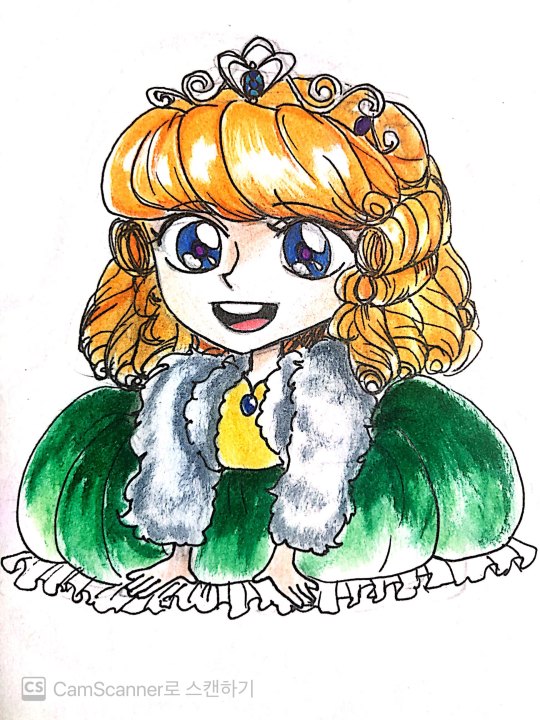
Name: Tatiana Hermia Finbar
Age: Immortal (500+)
Occupation(s): Princess of Fairy World
Aliases: Tatie
Friend(s): Poof, Twilight, Lil’ Summer Maiden
Interest(s): Playing with other fairy children, stuffed animals, napping
Relative(s): Oberon (father), Titania (mother), Aubrey (big brother)
Character
Tatiana Hermia Finbar, known as Princess Tatiana, is the youngest child, a daughter of King Oberon and Queen Titania, Prince Aubrey’s little sister, and the princess of Fairy World. Has been a toddler for 500 years, it is suspected that she might suffer from intelligence disorder as she lacked a proper care or educations mandatory for fairy toddlers as her parents were busy as Aubrey had been pampering her.
Background
Born as second-born, the daughter of King Oberon and Queen Titania, little Tatiana received love and attention from her people. She was pampered by her older brother as well. However, as centuries passed, she did not grow due to lack of proper care and education to be a fairy. Has no wings, she doesn’t know how to fly also.
Currently, all she can do was babbling couple of words such as “mama”, “papa”, “Aubie”, and few other words if she wants something. Due to the slow development, it is implied she might suffer from intelligence disorder. Her parents are now looking for a perfect babysitter who can educate their daughter into normal fairy.
#Fairly Oddparents#FOP#FOP fanarts#FOP OCs#Royal Fairies#King Oberon#Queen Titania#Prince Aubrey#Princess Tatiana
35 notes
·
View notes
Photo

This was an absolutely beautiful novel with a subtle allure that will linger in my mind for a long time. I love Miller’s writing style, which seems to pay homage to the Classics she loves and studies in depth.
It’s rare to meet a main character who is immortal, but here we have Circe, side figure in The Odyssey where she is painted primarily as a villain, born of an ancient god and a river nymph, yet living alone and on the fringes of the social stratification among humans and gods—a situation which, Miller must have intuited, bespeaks a woman who has not conformed to society’s expectations for her, the quintessential “witch.” What could growth of character within the experience of immortality possibly look like? This seems to me to present a real literary challenge, as so many books rely on character development, a change in the protagonist from beginning to end. Why would someone who is immortal grow or change? Why would their life play out with any type of directionality or plot arc?
I realized these problems with an immortal heroine part way through the book and started to ask how the structure of a novel could be forced onto the life of an immortal. How could Miller’s novel end? What makes the conflict and the resolution when the novel started with her birth? If Circe lives on and on, what might tell us that some part of her story has arrived at an ending?
These questions get brilliantly answered as (spoiler!!) Circle chooses mortality. In the process of the protagonist making this choice, the book poignantly reflects on what gives life meaning. Is immortality meaningless, when we have no motivation for growth and no motivation for life itself, as each day, each forever, we could do and try anything, ad infinitum? Is it our mortality, and our awareness of it, that makes any moment meaningful and life-changing? The meaning-making power of mortality is something Circe sees, and longs for herself, in observing the mortal lives around her. But it takes her falling in love with a mortal—Telemachus, strangely the son of her once-lover Odysseus—to make the final change in her, to bring about her own mortality through her magic. Circe’s relationships with both Odysseus and Telemachus capture the strangeness of immortality, as she is able to experience the lives and love of both men in a kind of stasis, while they change and age. Yet, Circe herself is changing internally and she is changed by each of her lovers. She is different when she loves Telemachus, softer and more open, although, in part, this must be Telemachus’s goodness to which she responds.
This book was incredibly satisfying, but also challenging (i.e. I didn’t always agree) in its re-characterization of familiar characters. Odysseus, who I kind of dislike in the original source text (sure, he wants to go home, but he also seems to be really “out there for the adventure”), was characterized according to his most epithet-worthy traits, a man so twisted by his own mind’s machinations that he doesn’t have much space for kindness or for receiving other people as people (this characterization seems pretty accurate to the original text). He’s also strongly associated with his true love for Penelope, a love he speaks about and references, but that seems strangely performative here (particularly as he falls willingly into Circe’s bed). I actually think Odysseus of the original text seems more likable, more loyal when compared to this portrait of him. I think he was characterized as too likable, too charged with uniqueness, in the middle part of this book when he’s first introduced, and while I felt weird about his affair with Circe, his preciousness is later dramatically challenged via the viewpoints of his sons. Telemachus, much gentler than Odysseus, is haunted by the murders he committed, on his father’s orders, of the maids Penelope’s suitors took for lovers during their sojourn in the palace. Circe’s son Telegonus is drawn to Odysseus and longs to go him, leaving Circe in order to go to Ithaca, only to accidentally kill the king with the weapon he’d brought with him (the string ray tail of Trigon given to him by Circe as a form of protection) when the king of Ithaca’s tries to seize it from his son who he will not listen to. We also see the ending of The Odyssey when Odysseus returns home and destroys the suitors through Telemachus’s eyes, the shocking changes in Odysseus, mad with suspicion, who is willing to eliminate all the nobility of his island country who have tried to usurp his place in his long absence.
I really love both Telemachus and Penelope in the original, and Telemachus offers, in so many ways, the counter-point to his father’s harshness and objectivity, both in The Odyssey and in Miller’s novel. Is Telemachus the man who modern readers will feel most drawn to in The Odyssey (I felt this, and would theorize that his virtues are widely appreciated)? Does his popularity—and the, therefore, fitting choice to have him be the real romantic love interest in Miller’s novel—reflect changing standards of masculinity with culture and time (is Telemachus admired in time periods later than that of pillaging Greece?) or a change in The Odyssey’s readership, as Telemachus appeals to female readers who once wouldn’t have consumed any reading, and especially classical reading, at a high volume? Selecting Telemachus, the ideal man, to play the romantic lead seems like a smart update of this text for the 21st Century audience.
This is my son, mine own Telemachus,
To whom I leave the sceptre and the isle,—
Well-loved of me, discerning to fulfil
This labour, by slow prudence to make mild
A rugged people, and thro' soft degrees
Subdue them to the useful and the good.
Most blameless is he, centred in the sphere
Of common duties, decent not to fail
In offices of tenderness, and pay
Meet adoration to my household gods,
When I am gone. He works his work, I mine.
~an excerpt from Ulysses by Alfred, Lord Tennyson
Miller’s novel reminded me, though, of how much more I adore The Iliad than The Odyssey, and examining the casting of Telemachus as the ultimate love interest over Odysseus, Hermes, and Daedalus, reminded me of the character that I’ve seen modern audiences most deeply adore: Hector. Several years ago, my new co-worker and I bonded over reading a student’s personal statement for college that was all about his love for Hector from The Iliad. This moment felt like joining a secret club of people who inherently understood each other, who felt some deep recognition of each other, who felt seen, because we loved and treasured Hector. “Hector, am I right?” “YES. Hector.” Hector was something beyond any words we had to explain him. We just GOT IT. I loved seeing a 17-year-old boy from Beijing, China read The Iliad and be like “HECTOR THOUGH” to me and to his other teacher. Hector is the softer counter-point to Achilles in The Iliad, the family-man, the son, the brother, the golden Prince of Troy. He is steadfast beside Paris’s ridiculousness. He’s the son for whom his old father will risk his life to reclaim his body. He’s the nearly unbeatable warrior who also gets the most touching of moments, gently holding his toddler, speaking with his clever wife. This is the man across Homer’s two books who was, for me, the most modern-day ideal. Maybe Hector has to remain, though, for all of us, shared among our common imaginations. Telemachus, it was fine if Circe claimed him.
Circe, at the beginning of the novel, is not a likable heroine. She’s clueless, bumbling, not attentive to way she’s being used by others. She doesn’t seem to have a lot of backbone. Yet, I was astonished at how much she changed and how beautifully wrought the gradual changes in her were. As she grows in independence, she grows immensely in likability. Although she has a happy ending with Telemachus, this love story somehow never felt inevitable. The different men she loves are part of her story. Yes, she is shaped by them, as she is shaped by her friendships, her rivalries, her relationships with her horrifying siblings. But the story is all about her. Circe is the center and her experiences with lovers shape her and her growth; she is not a side character in someone else’s story, bending to support them. She does change her immortality in response to love (in the sense of trying to fit herself to what someone else expects), but she brings about this change through her own power and strength of will. I can’t explain this right, but it’s true: it feels like a revolutionary notion that an independent woman be the main character and the story be just her story: the things she goes through on her own, with others, others passing through her life, her thoughts and feelings, her sequence of growth. It doesn’t sound revolutionary because we see female protagonists maybe 50% of the time these days across many genres (how far we’ve come!) yet how often do we see love interests exist in plots not to further the love itself (not to be arrived at, as a happy end point, a relationship, a marriage), but to further the growth of the female protagonist? Men, somehow, get to be the center of their own stories. Women, do they really get to have this? To be just THEM, and not be playing any role within society or within a family? Circe’s story arc made me SEE her as the main character in a way that somehow far too many female-led narratives utterly miss.
I realized, for the first time (which is frankly alarming), while reading this book that because Ithaca (New York, in my case) is my birthplace, I ought to feel a strange affinity for Odysseus. Ithaca is home. It has a mythic quality. I’ve lived in a lot of places. I’ve traveled a lot. I’ve seen things, people, landscapes, creatures beyond what I could have imagined. My life has been my own odyssey, and I’ve left Ithaca far behind. Unlike Odysseus, I’m not trying to go back. The world out here is full of adventures.
#circe#madeline miller#greek mythology#good reads#classics#modern audience#odysseus#telemachus#penelope#circe herself
12 notes
·
View notes
Text
Neptune
Neptune is the Roman God of the sea. He is the brother of Pluto and JUPITER.He is very similar to POSEIDON, the Greek god of the sea.Often associated with fresh water, he was first referenced in Roman mythology as being associated with water around 399 BC. Given a name that means “moist” in Latin, Neptune is often pictured as having a three-pronged fisherman’s spear. He is often shown to be an older man with a long beard. Neptune is sometimes seen with fish and other creatures of the sea around him. He is also associated with the sports horse racing. This is because of early depictions of him being pulled across the sea in a chariot pulled by a horse.
Early Beginnings
Originally, Neptune was a god of the ancient Italians who was not associated with the sea because the Italians did not have any such god at the time. Saturn was the father of Neptune, Pluto, and Jupiter. His mother was Ops, the earth mother. He also had three sisters: Vesta, JUNO, and Ceres. It’s said that Neptune’s father swallowed his children. It was his mother, Ops, who saved her kids by tricking Saturn into swallowing a stone. In his attempt to get rid of the stone from his belly, the children were released. They then turned on their father and teamed up to defeat him. After SATURN was defeated, the three brothers divided control of the world among themselves. Jupiter took control of the sky. Pluto became ruler of the underworld. And Neptune became the god of the sea.
Temperament and Behavior
Neptune is known for his violent nature and temperament. There are many stories that depict him as being difficult and somewhat vindictive. His behavior is said to reflect the unpredictable nature of the sea. According to one tale, it was his unpredictable nature that caused Neptune to make an attempt to overthrow his brother Jupiter and become ruler of the underworld. However, he failed in his attempt to accomplish this task.
Neptune and Earthquakes
Because of Neptune’s violent temper, he also became associated with earthquakes. At the time, there was very little understanding of what really caused earthquakes. And the ancient Romans thought they came from the sea, but had no scientific knowledge of things like plates and shifting of the earth. Since Neptune was the god the sea, it was thought that an earthquake occurred when he became angry.
Relationships
According to some stories about the Roman god Neptune, he had a wife named Salacia. Little is known about her. In ancient Italian mythology, she may have been the goddess of salt water. Neptune had three children with Salacia. The most well-known of three was Triton. Like his father, he is depicted carrying a trident (three-pronged staff). Triton also represents the sea in his physical appearance as a “merman,” the male version of a mermaid. Neptune also had a reputation for being a lady’s man. It’s said that he had numerous affairs. Because of these relationships, he had many other sons and daughters other than the three children he had with his wife. The most notable of these children are Pegasus and Atlas.
Neptune and the Water Nymph
Amphitrite is also a woman said to be Neptune’s wife. She is the woman most-often considered to be his wife rather than Salacia. According to one story about this relationship, Neptune saw Amphitrite, a water nymph, dancing on the island of Naxos. He was captivated by her beauty and instantly fell in love and asked her to marry him. She turned him down. Not to be deterred, Neptune sent one of his servants, a dolphin, to try and find her again. The clever and charming dolphin was able to convince Amphitrite to change her mind and agree to marry Neptune. As a reward for what the dolphin did, he turned the creature into an immortal and gave it a place of honor in the heavens in the constellation Dolphinus. This is why the dolphin is sometimes included in depictions of Neptune.
Evaluation of Neptune
Neptune was once a minor god who was not prominently featured as a key player in the stories that were told about Roman gods. In fact, it was often the god Fortunus who was associated with the sea before Neptune. Fortunus was also the god that was usually given credit for any Roman victories at sea. It was only when tales of the Greek god Poseidon became well-known that Neptune was elevated to his current status among ROMAN GODS. He would eventually be the god given credit for Roman victories during battles at sea.
Honoring Neptune
Because of the belief that he was helping the Roman’s win important victories, including the ability to take the ancient city of Veii, two temples were build to honor him. Special gifts were brought to the temple in order to keep Neptune happy. The idea was that by pleasing this god, the seas would continue to be favorable to the Romans. At one time, the ancient Romans held a festival in July to honor Neptune.
There’s no denying that Neptune’s legacy remains with us today. It’s Neptune’s name of “Neptune Equester” in reference to his association with horse racing that gave us the word “equestrian,” meaning related to horse racing or referring to someone who rides horses. It’s clear that many of the qualities associated with Neptune were borrowed from Poseidon. He is considered the definitive Roman god of the sea. In 1846, it was decided to name the planet Neptune after this god because of the planet’s bluish color. This is just one example of how this Roman god’s legacy continues to endure today.
8 notes
·
View notes
Text
Brick Club 1.3.7 “The Wisdom Of Tholomyes”
Oh my god there’s so much in this chapter, I’m so sorry for how long this is.
It’s probably just me, but this speech, or at least the beginning of it, reminds me of the way Shakespeare tends to write characters that are obnoxiously lecturing other characters (Polonius in particular comes to mind for some reason).
Tholomyes drunkenly stands up and tells everyone to slow down, to both eat and talk more slowly. But two chapters ago Hugo said they had finished eating. Go home, Tholomyes, you’re drunk. Tholomyes compares Talleyrand and Grimod de la Reyniere, one was a connoisseur of wine, the other of food, which is probably a “these people say savor your meals” statement.
Everyone else wants him to shut the hell up so they can continue their conversations and/or singing, which is funny. Also, I see so much Grantaire in this entire speech. Only, instead of a “down with your claws” remark going ignored, Tholomyes’ “You are it’s marquis” pun makes everyone quiet down, which he obviously takes as an invitation.
Tholomyes first segment about puns absolutely sounds like Hugo being extremely self-aware. He has an unlikable character criticize and disparage the excess use of puns, fully knowing the amount of puns that will be used later on in this book. Hugo mentions irony in conjunction with Tholomyes in 1.3.2, here he’s really displaying it.
According to wikipedia, the Jesus/Peter pun is due to a Greek translation, where “Peter” is translated to “Petros” and then the same sentence also contains the word “petra” (rock), so that Jesus is saying “Thou art Rock, and upon this rock will I build my church.” The Polynices pun is from Aeschylus’ play Seven Against Thebes. At one point the play’s chorus describes Polynices and his brother Eteocles as being “true to each other’s names, both truly lamentable (eteokleitoi) and both full of strife (polyneikeis).” The Cleopatra pun is basically Cleopatra mocking Antony, who is upset that Caesar is late to battle, calling Caesar’s tardiness harmless. The “prudence of Amphiaraus” is also a pun, since Amphiaraus was a Greek king and seer who continuously did things knowing they’d go wrong or fail. The “baldness of Caesar” pun is a play on words because “Caesar” means “hairy child” and Caesar himself was balding.
I’ve just realized that the “Est modus in rebus” (Moderation in all things) line is what reminds me of Polonius. I can’t help but think of his “neither a borrower nor a lender be” lecture towards Laertes.
Tholomyes suddenly gets a little more ominous and foreshadowing as he talks about how love should not be overloaded, and there must be restraint and ends to things, even love. “The wise man is he who knows when and how to stop. Have some confidence in me.” I love this for a few reasons. First, Tholomyes is pretty drunk here, and he’s the one calling for moderation in all things. Ha! Second, it’s funny that he’s telling people to have confidence in him when they all seem to want him to be quiet. Third, he’s got an interesting way of interpreting “how to stop.”
Which is actually a line that’s interesting to me. Previously I kind of thought this cruel prank was a thing he’d done to women many times before, with other friends. Except this “the wise man is he who knows when and how to stop” line sounds like he’s talking about trying to extricate himself from this whole situation. Maybe he’s never knocked up a grisette before; certainly he’s probably never had one actually fall in love with him before, since usually everyone’s on the same page. He wants out of this relationship that’s more than he signed up for. It’s definitely time to stop, and this is apparently the only “how” he knows?
Sylla was the first republican to seize power via military coup; but at the end of his dictatorship, when he had imposed all the changes he wanted, he abdicated and retired. I don’t understand the Origenes line, but I think that’s due to my cluelessness when it comes to the way different areas of Christianity work.
He pronounces “friends” in a few different languages, which I can only imagine as being very slurred and with sloppy, ridiculous gestures. He waxes poetic (or something) about how to have no passion or love. I can’t tell if he’s talking about having an affair without falling into marriage/love, or feeling nothing at all. In the next lines he certainly seems annoyed with himself for getting mixed up with someone who has actual feelings for him.
Here’s more shades of Grantaire. Tholomyes has this whole rant on each country’s measurements; Grantaire has his rant on each country’s popular trade. But Grantaire’s is a political and social critique, while I think Tholomyes’ might be a dick joke?
Tholomyes isn’t even subtle about his affair with Favourite here. He straight up insults Zephine and calls her ugly, I think he insinuates that Dahlia is boring, and then he basically dismisses Fantine and calls her an airhead. And in the middle of this he sings Favourite’s praises. He specifically calls attention to her mouth. Also, he refers to her with “tu” instead of “vous,” the first time he uses the familiar with her, at least with company around.
God, he talks about Fantine like she’s not even there. What an asshole. I hate him so much. He talks about Fantine like she’s not there, and she doesn’t do or say anything to contradict that. Again, she gets no dialogue in this chapter. Where is Fantine at, mentally, in all of this? Because Hugo does this a lot: he’ll describe someone or something in idealized tones, and then a chapter or two later a character will have dialogue describing that same person/thing, but in much more down-to-earth ways. Fantine and Cosette are both described in conjunction with birds. Only, Cosette is a bird, and Fantine is staring off into space, imagining birds. Honestly if we’re still going about this with the headcanon that she’s on the spectrum (which I am, I love it), this sounds like an overstimulation shut down. Hell, my adhd brain does the same thing when I’m in places that are really loud and busy and there’s not really a point of focus. If everyone around them is yelling and laughing and singing as much as they are, then it’s probably horrific in this pub.
Tholomyes is so blatant here about his intentions around Fantine. “I am an illusion--but she doesn’t not even hear me...” I think this piece of dialogue is twofold. Tholomyes is again hinting at his plan to leave, to end everything; his relationship with Fantine is so fake as to be an illusion. But it’s also here to describe Fantine, who is dreaming up a relationship that doesn’t exist. I kind of get the feeling that Tholomyes hasn’t been very nice to Fantine for a while, hasn’t been trying to keep up the pretense of this relationship, and yet Fantine is so wrapped up in her own personal illusion that they’re in love that she is unable to notice or see his assholery.
Yet another shade of Grantaire here. This monologue describing Fantine made me think of R’s “Chowder is ugly” monologue. Tholomyes describes Fantine as the “daughter of chimeras” while Chowder is a chimera. They both get classical allusions: Fantine is a nymph, while Chowder is a gargoyle instead of Galatea. Chowder gets hair like lead, while Fantine is a jewel. Both men are drunkenly harassing women and being real obnoxious about it. The difference is a) Chowder is probably used to it as waitress and Grantaire doesn’t seem to mean genuine harm and b) Tholomyes is “in a relationship” with Fantine, and that’s no way to treat someone, and it definitely sounds like he’s mocking her in front of her face to other people.
The “too much sugar” rant goes with the marriage one, I think. According to Tholomyes, women are too obsessed with the fairytale-type nice things, spend too much time imagining sweetness like a wedding. I’m not sure how popular trash romances were at the time (I know Hugo mentions that Mme. Thenardier reads them) but I wonder if he’s referencing reading those as well.
“Make conquests. Rob each other without remorse of your beloved. Crisscross and double cross. In love, there are no friends. Wherever there’s a pretty woman, there’s open warfare....” You know what, I think Tholomyes actually really wants Fantine to figure it out. At first I thought he was being an annoying asshole and acting like this because he knows she doesn’t get it so he doesn’t care. But I actually think he wants to see her put it together. He’s still talking in metaphors and references, but I think he wants Fantine to realize that he’s cheating, that he doesn’t love her back and this is just a fling. He wants her to be on the same level as everyone else. I don’t know if he wants it so that there’s a better chance of them getting away without consequences, or if he’s a cruel bastard (he is) who wants to watch her world collapse. He’s been saying it louder and louder and more and more obviously as the speech goes on. But as he says just a paragraph before, Fantine just doesn’t get it. Either she truly doesn’t notice, or she refuses to see. He describes her as so distant here, I think she truly doesn’t notice or get it.
This is also a bunch of references to women who were historically raped. He basically seems to be saying that when you refuse to settle down, you get the “benefit” of being the enemy and taking other people’s partners. Gross. Hugo really knows how to write a slimy, unlikable asshole. And even his friends seem to think he’s going to far, because they tell him to stop talking, and when it seems like he’s going to start up again, they sing some annoying rhyming song. Why they thought that would shut him up, I don’t know.
He really does spend this whole speech dropping hints. “Let’s finish our course of study with folly and food” sounds like he’s talking about messing around with the women, but also definitely sounds like a hidden “ooh, you’re about to get tricked and feel so stupid.”
He spouts off a bunch more springtime allusions (comparing nightingales to the opera singer Jean Elleviou, Jardin du Luxembourg, pastorals about various upper-class streets, etc.) The pampas line is interesting. Pampas are big open fertile lowlands in South America, as compared to the covered arcades of the Odeon theatre. Again I think this is a twofold joke: on the one hand, literally the Pampas is a place Tholomyes could go and become a landowner and be a rich independent colonizer, but he feels he does perfectly fine shmoozing at the the theatre in Paris. Less literally, this could also be a sex joke, similar to Grantaire’s “if only I wanted to,” only worse. Basically he’s saying “look at all these girls I could go fuck in other places, but I get enough tail in the theatres of Paris.” Gross.
He then kisses Favourite “by mistake.” I think at this point he knows Fantine is never going to get it. But Favourite is clearly in on the joke. He doesn’t even care anymore, he’ll cheat on Fantine in front of all of them because they all kind of know except Fantine--who isn’t going to figure it out, obviously.
#les miserables#les miserables meta#brickclub#lm 1.3.7#les mis#les mis meta#y'all have no idea how much fun i have researching the references#even though sometimes i don't know enough about french history to really dig deep
8 notes
·
View notes
Note
First ask, so hopefully don’t ramble too much. This is inspired partly by your drawing of Newt as a nymph and some facts about the river god Scamander. In myth, there were two branches of his river, one warm and one cold. What if Newt’s and Theseus’s dad is the river god Scamander and the brothers are the two branches? The two brothers have wandered among wizards for centuries. They get revealed, and while Theseus looks like a Trojan warrior, Newt always ends up in that outfit. Whatever pairing
Newt appears on Earth every now and then in his human form and always wears a beautiful dress, he does it to play with the creatures that live in forests or places near rivers and he makes sure the creatures are safe and happy.
Some people have been lucky enough to see him and always are mesmerized by the way he looks; he's beautiful and kind to those who get lost or are there but do not wish to cause any harm to the creatures.
A few (or perhaps more than a few) end up falling in love with him and sometimes they write songs, poetry or even make paintings of him.
Other have tried to approach him, to woo him, but they always fail for Theseus Scamander appears in shining armor and ready to scare off any mortal suitor Newt has at the moment.
There are legends and stories about them. A woman says that even if it hasn't happened yet, one day it will. Either a mortal or another god will win Newt's heart.
"And that," the woman adds as she slams her beer on the counter. "Could mean either happiness or doom for us. Gods' affairs always affect us in one way or another."
Some people gasp when they listen to her words, others roll their eyes and shake their heads because she's a little bit drunk after all...
She doesn't know anything about gods.
***
Kofi / Patreon
14 notes
·
View notes
Note
For a prompt (if you’re still taking them): Rosalie x Bella but the setting is The Secret History?? Yes that is purposely vague because I’m interested in what you’ll come up with.
Oh my god, these are two of my favorite things, I absolutely love this prompt and I really hope I’m making it justice to both Donna Tartt’s writing style and this premise!
( also, let’s just pretend there’s no murder or incest because. well. i didn’t want to include that. vampires is dram enough. )
*
Bella had not planned ahead of Hampden.
The idea alone of getting here had been a long distant dream, unattainable in its difficulties, and yet, after barrier after barrier were dropped by what had then felt like the invisible hands of Fate– she found herself overwhelmed by its uneventfulness.
That first week, she had passed as if in a dream, haunting the halls of her dorm in search of something to do, someplace to be. Jessica Stanley, the girl who lived two doors down her own, had done her best to entice Bella into embracing the nightlife of the campus. "A party or two won't kill you, Bella," she had said more than once, red nails glinting in the ceiling lights, "aren't you like, from California or something?"
In hindsight, one might say it could’ve, it did. At the time, though, Bella had not corrected her, too conflicted between Forks and Phoenix, two towns so unlike one another, she wondered what that said about her.
In any case, maybe that's why she had been so drawn to them in the first place. When placed against the grey backdrop of cloudy Hampden, their mismatched group had seemed to glow, lighthouses in the underwhelming sea of students.
Honestly, how could Bella not be hopelessly drawn?
She had seen Emmet first, his large figure standing out in the crowd, laughing at something, loud and careless, and his beer had sloshed dangerously closed to spilling from the crytal-clear glass in his head. That, too, had struck her as odd, even then– a glass cup in a dorm party full of red cups– and to this day, Bella could map out the way moonlight had glistened on his pale skin, a Greek statue, fluid and alive. She hadn’t approached him that first night, even if her eyes lingered on absurd difference of his posture and Jessica explained in excruciating details who he was and why she should not get herself invested in a lost cause, but after noticing, after knowing about them, Bella couldn’t help picking out the flashes of their presence all over the campus.
Next, came Alice, a nymph of a girl, with her pixie haircut and bubbling smiles, floating through the grass in strange clothes that made her look inexplicably ethereal, half-there, half-somewhere else. The first time she saw her, Alice had an umbrella over her head in the rare sunny day, and Bella had thought it strangely endearing, smiling to her book as Alice breezed past, the faint smell of cherries and lavender following. Later, she would find that Alice had not taken that path through the grass by chance, but a deliberate attempt at seeing Bella in person, in the present, living and breathing and alive.
Then, there had been Edward. This one had been nothing but luck, or, as Bella had been rather inclined to believe at the time, Fate or something of that effect. His red hair had been a flame of color in the library, making his hesitancy at the threshold all the more noticeable, and Bella had taken in his pressed shirt and dress shoes and prayed fiercely he’d find another empty seat that wasn’t at her table. With a pained expression, Edward had sitten down across her, his hold on the edges of the desk white-knuckled, and it had not taken him fifteen minutes to abruptly stand up, chair screeching on the floor, and dash out the open doors. Bella had tried not to take it to heart and failed– if this were to be her first impression with the mysterious Classics class, she couldn’t bear to think of her odds of enrolling.
Of course, one can not forget the twins. Jasper and Rosalie Hale. The similarities between them were easily spotted from a distance– both are golden-haired in a way that glimmers in the light as if true gold, curling at the ends, and regally tall, heads held high as if bearing an invisible crown. Apollo and Artemis, side by side, their divinity like a halo shimmering in the air around them. Jasper with his melancholic eyes and perpetually haunted expression thrives in the gloom of the town, a true Byronic hero in his quiet demeanor and bottomless devotion towards Alice.
And Rosalie– here, Bella can’t find the words to accurately transmit the truth. How can one describe true divinity? How do you explain the exhilarating surprise of finding the closest thing to a goddess in modern times? Anything Bella could say is inevitably tainted by her own biased view; Bella could never be neutral when it came to Rosalie, not even in the beginning, not even now. Ice queen, Jessica had called her, but Bella had never agreed with that description– queen is too little a title for Rosalie and how can you blame a deity for not concerning herself with mortal affairs? Just the idea of Rosalie in a house party is enough to send Bella into a laughing fit, no matter how many years go by.
So yes, Bella had been a bit in love with the Classics class before she had even knocked on Carlisle door, but no one would ever be able to claim her heart and soul quite in the way Rosalie did, not then, not ever.
Perhaps, it's only that in the same way things often do, that group lost shine when looked from up close – once she was side by side with them, it was easier to see them as people rather than the cryptic image they telegraphed. Not that she loved them any less; again, as things often do, her love just shifted.
Still, it wasn't easy. Carlisle turned her down twice, warmly polite every time, before yielding to her stubbornness; privately, Bella thought it was her love for Paradise Lost that did it, not strictly a Classic, but a personal favorite of Carlisle nonetheless. Of course, years later, she'd find that while quoting Dante did work to endear her to him, it had been Alice's pleading that solidified his decision, her talks of future days, laughing in a town by the woods, a fireplace running while music played quiet.
Never let it be said that Carlisle doesn't put his children's happiness above everything else.
That had been about two weeks ago. When Bella walked into class now, the scene she finds while looking fitting for a renaissance painting, was rapidly becoming normal for her. Edward and Jasper sitting on their desk, speaking in low tones with eyebrows drawn together, worried and fearful and terribly melancholic, tragic heroes of the turn of the century, Emmet playing on his phone, the electronic chime drifting jarringly in the picturesque atmosphere, Alice glancing up from her magazine, clippings scattered around her desk, and grinning up at Bella just a second too soon to be a coincidence, hair spiking at all directions, a nymph stranded in the city, her magic wild on her eyes, and finally– Rosalie, sitting on the window sill and looking out at the fields, face impassive, the sun catching in her hair like golden threads, a perfect statue, and Bella wonders if this is what Paris saw every time he walked into Helen's tower; if so, it'd make sense for him to go to war over it.
Bella took the desk closest to Alice, skin burning in a way it shouldn't, not when it was untouched like this, and her bones sang to find a different direction. These first few days, they were wonderfully confusing, and there were times she wished to go back to them, to the simplicity of ignorance.
But then, of course, Rosalie would press a kiss to her lips, drinking the nostalgy out of her mouth, and Bella would forget why she'd look at the beginning as anything other than that– the turning point of her life, the starting of something new.
#twilight#rosella#Bella Swan#rosalie hale#rosalie x bella#the secret history#look an ask#twilight tag#rosella tag#tsh au
47 notes
·
View notes
Text
WIP Intro: CROSSWATER

You can argue that your home is the W O R S T, the most P E C U L I A R, the C R U E L E S T in the whole of A N D R A S T E, but I know the truth, and the truth is that C R O S S W A T E R is the worst place I’ve ever had the misfortune of living in...
But it is H O M E.
⇒TITLE: Crosswater
⇒THEMES: Coming of age | Power and corruption | Prejudice | War | Self-Reliance | Oppression | Religion | Self Empowerment
⇒RATING: Teen and Up
⇒GENRE: High Fantasy
⇒SUB-GENRE: Dark Fantasy | Romance | Religion | Politics
⇒POV: Third person limited
⇒STATUS: Plotting/Outlining

In the peculiar city of Crosswater strangeness is nothing unusual. But no one mentions the thieves at the edge of town, the quiet Captain of the Guard with a hoard of secrets, the Lord and his wife with ambitious affairs, and the too smart, too good singer. After all, it has always been ordinary to them.
Then a woman arrives in the city with a wild power no one could’ve predicted. She brings with her soldiers sworn to her name and a sigil of the distant Hell witch empire, Darah. A proposal she hopes they will not ignore. Her name is Nemesis Lorelai Macaria, and she is the last princess of the remaining witches of Hell.
She will have to befriend the master thief with a silver tongue, the siren-like woman who fears nothing and no one, the Captain who will provoke her until she snaps, the rebellious Lady of Crosswater with a quick wit, and the orphan girl from a distant land if she is to succeed in her plan. But first, she must convince them to accept her as who she is. A witch--and a servant of Hell.
It should be easy enough.

Nemesis Macaria: The hero. Crude, abrupt sense of humor. Broken childhood. Unable to empathize with many people. Usually very independent in her adventures. Seems like shes killed a lot of people but no one really knows. Talented in dark witch-craft and necromancy. Eighteen: too young for this but having fun anyway. Keeps her composure no matter what.
Cassius Verlander: The unlikely friend. Loud. Loves challenging authority. Only steals from the rich people of Crosswater because “fuck the bourgeoisie.” Mean but cannot kill anyone. A secret cinnamon roll. Angry. Greatest thief in the Andraste. Loves the black market. Knows the price of everything in your house and everything in your body.
Corvina Naida: An actual goddess. Really sweet and lets it show. Still doesn’t let herself get taken advantage of. That one friend everyone loves. Knows how to manipulate people when she wants to. Unbelievably talented. So much so that Nemesis is thinking that maybe she might just be an actual goddess. Gets ahead of herself. Too confident at times. Will love you unconditionally.
Soter Adrestia: Dick to prick to a genuinely nice guy. Very closed off. Thousands of secrets and not enough time to tell them all. Kills people but always feels guilty about. Likes insulting criminals and strangers who he doesn’t trust even though he’s probably the most untrustworthy person alive. You know the phrase skeletons in the closet? Yeah. He most likely has like fifty tucked away in his. Real ones too.
Orlaith Clearwater: Victim of whoever the fuck thought the patriarchy was a good idea. Hates her husband because she didn’t have a choice. Her life has always been trade agreements. Sick of this bullshittm. Definitely a huge lesbian. Sometimes has more affairs with women than her husband. Will do anything to destroy him. Is going to kill the next person who calls her exotic.
Eris Lada: Loyal as all hell. Would happily kill anyone for Nemesis and not feel an ounce of regret. Seems a lot older than they let on. Totally shocked by the way equality and respect isn’t common in other places. Like, wot? Secretly trying her best but failing. Will not ask for help. Everything she does is reverse psychology.
Apate Gianna: Quiet. Lowkey a huge bitch. Acts tough but really isn’t. Gives off a weird vibe. Orphaned when she was young. Grew up alone. Social queues? What are those? Has she looked at you lately? If so, she probably hates you.
Fervain Clearwater: NO REDEEMING QUALITIES. Probably the worst person alive. Misogynist, racist, homophobic, #godlover. Not even worthy of the title antagonist. Nemesis would have just killed him if not for this damn agreement. Redeeming quality? Killable.

The story of Crosswater takes place in the kingdom of Andraste. It is split in two by the Lethe mountain range. Crosswater lies along the northern coast of Andraste’s western island where the forests are abundant and the temperatures are commonly frigid. Although it is small, it holds an abundance of power over the neighboring kingdoms of Tarasi, Elpys, and Isoldé. Although the western island is the weaker of the two it still holds much political prominence, especially in Crosswater where Fervain has been lord for more than two centuries.
In Crosswater, there are two rivers--one flowing north to south and the other flowing east to west. These rivers are believed to be a center of religious power which allows a greater connection between the citizens of Andraste and The One True. Many will frequently go on a pilgrimage to this location for enlightenment.

Humans: Within Andraste’s borders humans are the most common. The majority of them lack power and live to 75 on average. Though through rigorous studying beginning at a young age humans can hone an element. Those of which being ice, lightning, wind, earth, nature, mind, space, blood, water, and fire. It can take anywhere from ten to twenty-five years to master an element.
Witches: Witches are creatures belonging either to the Aether or Hell. Andraste and it’s neighboring kingdoms had outlawed witches of Hell after the events of the Holy War. Most witches of Hell were killed off in the drownings, though some do remain hidden in Andraste and outside its circle of power. Those witches of Hell reside in either Kenna or Dhara, of which Andraste has been at a stalemate with for the past six centuries. Witches of the Aether can live up to 2,000 years, and it is rumored that when they pass they are resurrected as angels. No one knows how long witches of Hell live for, due to the fact that they have always been hunted and prosecuted except in Kenna and Dhara where their secrets are well hidden, but many believe that when they do die they come back as demons.
Witches are born with abilities. Witches of hell are more prone to do unnatural magic, while Aether witches do natural magic in order to keep The One True’s order. Though, in cases of great strife, a witch may utilize an opposite power. Even if they are born with abilities witches can work to hone one single ability.
Angels: Rare. Sovereigns among the other species. Frequently in roles of great power. Although none have died natural deaths yet it is shown that they do age slowly and that they can be killed, making them slightly vulnerable. Angels possess the ability to contact The One True, manipulate light, and take possession of other beings, though some do have immunity to their mind control.
Demons: Despite the fear many feel towards demons very few have met them, and most who did have lived to tell about it. They, unlike Angels, can maintain a deep connection with the Fallen One. Most demons possess the ability to use magic as well as manipulate darkness. Not only that, but they can take possession of beings as well with seemingly no limit to this power.
Dragons: Beings with the ability to shapeshift and manipulate flames, ice, clouds, or water. After many years of interbreeding, bloodlines became diluted, leading to pure bloodlines to quickly take power throughout the four kingdoms.
Nymphs: Guardians of different areas of nature. They serve the world--not Aether or Hell. Sought out in times of confusion because of their natural desire to search for balance.
Ghosts: Creatures that had once served witches during the Holy War. They have the ability to shapeshift into any animal form as well as into apparitions. When their service became unneeded they turned to work in an array of dangerous fields because of their power to shift through solid matter and remain invisible to.
⇒
this wip is not something I planned to get so into but now that I’ve brainstormed all of this I may begin writing it while I’m editing TNO!!! I do plan on posting OC intros and more on Crosswater though probably not until I’ve finished outlining. Please ask me questions about this so I can keep brainstorming and developing my characters and the plot.
Let me know if you would like to be tagged in Crosswater content from now on!
#wip intro#wip introduction#writeblr#writers of tumblr#my wip#crosswater#new wip#new idea#amwriting#world building#ocs#my ocs#original characters#my work#my writing#my novel#high fantasy#fantasy#romance#religion#politics
36 notes
·
View notes